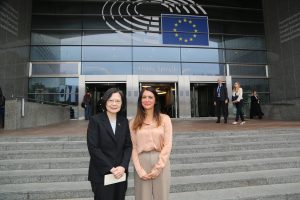In international diplomacy, revolutions don’t always arrive with a bang. Sometimes, they unfold quietly through carefully orchestrated steps and strategic investments. Such is the case with former Taiwanese President Tsai Ing-wen’s recent visit to Europe – a diplomatic tour that marked not a sudden upheaval, but the culmination of years of strategic diplomacy. This patient, prudent approach reflects the calm and composed demeanor of Taiwan’s first female president, showcasing her leadership qualities both during her tenure and after leaving office.
Tsai’s recent European tour has set a new precedent in Taiwan’s diplomatic playbook, highlighting the island democracy’s growing international stature through “post-presidency diplomacy.” Tsai’s trip achieved a remarkable “one-two-three” milestone: She became the first former Taiwanese president to visit the European Parliament; she followed Lee Teng-hui’s footsteps as only the second former Taiwanese president to participate in person at the prestigious Forum 2000 in Prague; and her itinerary encompassed three European nations – Czechia, Belgium, and France – reinforcing Taiwan’s diplomatic bonds across Western and Central Europe.
This visit was not an isolated event, but rather the fruit of Tsai’s farsighted investment in, and unprecedented elevation of, European diplomacy. Influenced by her studies in the United Kingdom, Tsai injected new energy into the once-lackluster Department of European Affairs in Taiwan’s Ministry of Foreign Affairs from the outset of her administration. Determined to strengthen ties with European nations, she made unprecedented political appointments of qualified professional diplomats to key countries.
Several outstanding envoys – Wu Chih-chung to France, Shieh Jhy-wey to Germany, Huang Wei-feng to Switzerland, Chang Hsiao-yueh to Austria, Liu Shih-chung to Hungary, and Roy Chun Lee to the EU and Belgium – have frequently made headlines in local media. For eight years, these ambassadors have quietly yet persistently cultivated relationships, built trust, and planted the seeds of progress. They have conveyed a unified message across Europe: Taiwan’s value as a partner in innovation, trade, and democratic values highlights its long-overlooked importance to European security and prosperity.
Now, the fruits of their hard work are ripening, evident in the unprecedented levels of engagement between Taiwan and European nations. Taiwan’s patient, people-centric approach shines as a beacon of effective “resilient power.” Diplomacy, after all, is not about bullying others with the loudest voice; it is about forging ties with respect and empathy for mutual benefit.
In Czechia, Tsai’s inaugural in-person participation at Forum 2000 proved pivotal. Her address, “Overcoming Authoritarian Threat through Democratic Unity,” resonated with the audience and highlighted Taiwan’s commitment to stand with democratic allies. The warm reception from Czech leaders, including President Petr Pavel, Senate President Miloš Vystrčil, and Parliamentary Chamber of Deputies President Markéta Pekarová Adamová, underscored the crucial role of leadership diplomacy in bilateral relations.
Furthermore, Markéta Gregorová, a member of the European Parliament for the Pirate Party, called for a “One Taiwan Policy,” offering a fresh perspective on how Taiwan’s international status could be perceived and managed.
The French leg of Tsai’s tour centered on strengthening economic and cultural bonds. The former Taiwanese president’s meeting with MEDEF International, France’s largest business association, and her visit to the esteemed Université Paris-Saclay highlighted opportunities for enhanced cooperation in key industrial and academic fields. These engagements laid the groundwork for a more robust France-Taiwan partnership, emphasizing collaboration in cutting-edge areas such as semiconductors, renewable energy, and digital innovation. This strategy aligns with both nations’ strategic interests while showcasing Taiwan’s growing prowess in technology diplomacy.
In Brussels, the heart of the European Union, Tsai’s meetings with over 30 current members of the European Parliament reflected a growing willingness to engage with Taiwan, despite potential geopolitical pressures. These meetings aimed to send a clear message to the world: While countries have their own versions of the “One China” policy, this does not prevent them from developing strategies toward Taiwan based on their respective interests and risk assessments. This shift in attitude could have far-reaching implications for Taiwan’s global standing and its ability to contribute to world affairs.
A crucial yet often overlooked aspect of this visit is the composition of Tsai’s delegation. Her companions included former Minister of Economic Affairs Wang Mei-hua, now in a private financial role, and a group of high-tech industry leaders attending specific events. Deputy Secretary-General of the National Security Council Hsu Szu-chien also joined the team. This blend of economic and national security figures highlighted Tsai’s goals and aspirations for this diplomatic journey.
The timing was also well-chosen. On October 24, the European Parliament voted on the new term’s first pro-Taiwan resolution, addressing “The People’s Republic of China’s misinterpretation of U.N. General Assembly Resolution 2758 and its ongoing military threats around Taiwan.” The resolution “underlines that UN resolution 2758 does not take a position on Taiwan” and “calls on the EU and its member states to support Taiwan’s meaningful participation in international organizations.” It also expresses Parliament’s concern about “China’s increasingly aggressive behavior, in particular in its own neighborhood, such as the Taiwan Strait.”
Tsai’s well-timed visit may have helped bolster support for the resolution, which passed with overwhelming support, 432 votes to 60 (with 71 abstaining).
Despite progress, significant challenges persist. China continues to pressure nations to follow its “One China” principle, while the EU balances economic engagement with the world’s largest market against safeguarding its industrial competitiveness and security interests. However, the growing awareness of “chip security” may present opportunities for Taiwan to leverage. A potential Taiwan-EU Bilateral Investment Agreement (BIA) could also be a game-changer, offering a framework for increased trade and investment despite the absence of formal diplomatic relations.
As these developments unfold, while Taiwan’s international status has not changed dramatically in recent years, a clear shift is occurring in the geopolitical landscape. The world should take notice.

































